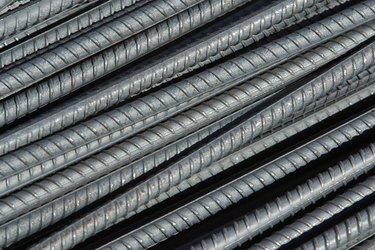
Drilling through concrete is tough to begin with, but when your masonry drill bit encounters a piece of rebar the project comes to a screeching halt. Masonry drill bits are coated with mineral grit; they pound and grind through brick and cement-based materials. Although abrasive bits are capable of grinding through steel rebar, sharp-edged drill bits are faster and more effective. If you learn about the types of drill bits and drilling procedures required to drill through reinforced concrete slabs, you can reduce the effort, time and materials required to complete your project.
About Masonry Bits
Video of the Day
Masonry bits' shanks resemble wood and metal bits' shanks; they consist of a grooves helically coiled around a rod-like shank. However, whereas wood and metal bits have sharp tips, masonry bits have abrasive tips. The tips of masonry bits are coated with a mineral grit, usually diamond or carbide, that grinds through concrete and other masonry materials, such as clay brick. While wood and metal bits' sharp tips are useless against concrete and brick, masonry bits' abrasive tips quickly bore through rock-hard substances. On the other hand, masonry bits' blunt, abrasive tips are largely ineffective at boring through wood and metal.
Video of the Day
About Metal Bits
Most metal bits fit into the category of drill bits called "twist bits." Twist bits have a pointed, tapered tip and a shank lined with sharp-edged grooves. Manufacturers typically produce metal-cutting twist bits from hardened steel and coat the bits' exposed surfaces with metals that resist overheating. Like wood twist bits, metal twist bits' grooves not only bore through metal, but also push waste material to the top of the entry hole.
Drilling Through Reinforced Concrete
Concrete drill bits are the right choice for drilling through reinforced concrete. However, because builders don't leave any indication of the location of rebar, there's always a chance that your concrete drill bit will encounter metal. When your concrete drill bit hits rebar, you should stop drilling and replace the concrete bit with a metal bit. Once you clear the metal, you can reattach the concrete bit and continue drilling through the masonry material.
How to Tell When Your Masonry Bit Hits Metal
If you learn to notice when your masonry bit hits metal, you can avoid wearing out your bits' tips and reuse your bits for later projects. The primary indicator of a masonry bit hitting metal is resistance to drilling. In other words, pushing the bit forward suddenly becomes more difficult than usual. If you find yourself pushing harder and making little progress, it's likely that you've hit metal or encountered a piece of aggregate embedded in the concrete. Whereas aggregate eventually breaks, metal won't easily yield to a concrete bit. Another common indicator is sound. Even through ear plugs or ear muffs, you can hear the sudden change between drilling masonry and hitting a piece of rebar.